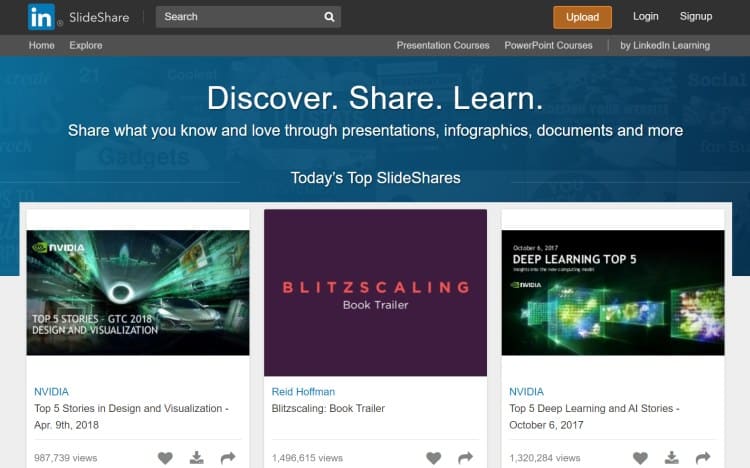6 Places You Should Be Publishing Your Content Other Than Your Blog

After spending so much time and effort crafting a perfect blog post, you may be ready to call it a day.
But if you don’t make an effort to reach new audiences on other platforms, you’ll limit your reach and your ability to gain traffic to your blog. By posting your content to these sites, you’ll increase the number of users who will stumble onto your content who may have never heard of you otherwise. Every additional place you post will increase your potential exposure. And that can only be a good thing!
So here are six places that you should be posting content to both help build your blog and improve your professional reputation.
#1 LinkedIn

Chances are, you already have a LinkedIn profile. 50% of college-educated Americans are already on the site. Even better, 45% of LinkedIn’s users are in upper management. So by posting your content to the site, you can get your name and expertise in front of the decision-makers in your industry.
When you post content to LinkedIn, your article will be shared with your connections and the people who follow you — subject to the algorithm, of course. Make sure your post visibility is set to public so it can reach the largest number of people.
Another benefit — LinkedIn posts are searchable by keyword and easily shared. Make sure to add hashtags to your post to make it easier to find. You can research hashtags by typing them into the search bar. Check how many users are following those hashtags, and use some popular (and appropriate) tags on your content to get it in front of more people.
#2 Reddit

Reddit is probably not the first place you think of when you’re considering ways to build your business reputation. The site is more well-known for the exchange of memes and funny stories than informational blog posts.
But with 330 million active monthly users, there are a ton of people on the platform that you could be reaching — especially if your audience is on the younger side. 42% of internet users between the ages of 18 and 24 use Reddit!
If you’re not familiar with the site, here are a few basics. Reddit is really a collection of niche forums called “subreddits.” There are subreddits on just about any topic you can think of. Users make posts within a subreddit, which other users then “upvote” or “downvote” depending on if they like the content or not.
Reddit has its own unique etiquette that differentiates it from most other social media. To start, anonymity is highly valued on Reddit. Usernames are almost never real names, and personal information is carefully protected. Also, each subreddit has its own set of rules, which you’ll need to follow or risk getting banned.
People spend time on Reddit for entertainment and education. Your content will need to fulfill one (or both) of these needs. So self-promotion must be done with care. Redditors don’t expect to be marketed to like Facebook users.
To get started on Reddit, join any subreddits that are relevant to your market or industry. Start reading other people’s posts and joining in where you have something interesting or helpful to add to the conversation. It’s important to become part of the community. People start to recognize other usernames quickly, and if you’re contributing valuable content, it will be noticed. You can provide links to your blog posts, but it has to be relevant!
You can also do an AMA — Ask Me Anything. You can introduce yourself as an expert in your field, and invite users to ask any questions that they may have. Just don’t get offended if you get asked some very strange questions — it is Ask Me Anything, after all.
#3 Quora

Quora calls itself “...a place to gain and share knowledge.” It’s a question and answer website where users are both the askers and the answerers. There are 300 million active monthly users, including 35% of Americans.
54% of Quora users have an annual income of over $100,000. So it’s a good idea to position yourself as an industry authority in front of this audience with such high purchasing power.
Search the site for questions that are relevant to your industry. When you find a good question, check out its “Question Stats.” This includes how many followers the question has, and the number of total views. If it’s a popular question, use it as inspiration for a high-quality blog post. Then post highlights from your blog post as an answer to the question on Quora. Include a link directing people back to your blog for the full post.
This way, you can get extra traffic back to your blog!
#4 Medium

Medium is a blogging site where users can post original articles on whatever topic they choose. There are 60 million monthly active users on the platform, providing a nice little user base that you can access with your own articles.
The real benefit to Medium is that you can repost content from your blog on the site without fearing a “duplicate content” penalty. In general, reposting content from your blog onto a bigger site can hurt your blog’s SEO. Google will view the site with better domain authority as the content’s source and will ding your blog for the duplication.
But if you import your content from your blog using Medium’s import tools, Medium will designate the source of the post (your blog) as the canonical link. That means it will tell Google that your blog was the source of the content. There will be no duplicate content penalty for your site. In fact, it could actually help your SEO.
Plus, if you get more than 200 likes on your post in under 24 hours, you have a good chance of your blog post being featured on Medium’s homepage. That could bring in huge views and a lot of new connections!
#5 Facebook

Everyone knows that Facebook is the 500-pound gorilla of social networking. Almost 2.5 billion monthly users make it the most popular social media site by far. If you’re not publishing original content and links to your blogs on your Facebook page, you’re making a mistake.
There may be a lot of talk about organic engagement on Facebook dropping. But it’s still the number one place that people go to get information about a company or entrepreneur. There’s nothing like a dead Facebook page to make potential customers or colleagues doubt whether you’re still active in your industry.
#6 SlideShare

SlideShare is a site that lets users share presentations and slideshows with its 80 million monthly visitors. It’s a subsidiary of LinkedIn.
The benefit to SlideShare is it provides a perfect platform for repurposing your content. After you’ve written a great blog post, you can repackage that same information into a PowerPoint or Google Slides presentation and upload it to SlideShare. This way, you can get additional views on the same information that you’ve already collected.
Since the research has already been done, you may even be able to outsource the creation of the slideshow to a freelancer, saving you time.
SlideShare is a great way to reach people who are on the hunt for information in small, digestible bites, instead of a long blog post. If people like you on SlideShare, they can follow you to get easy access to your future posts.
Don’t forget...
Remember that when you post to any of these places, you don’t have control over the platform. It’s possible that one day, LinkedIn could go belly up — and then all of your hard work on that site goes away.
That’s why these sites should be used as supplements to a blog that you own and control — not instead of one. And make sure you save personal copies of all of your blogs and articles. That way if one of these sites does disappear, you can republish your content on another one without having to rewrite it.
Author: Rudy Labordus
Rudy Labordus is an Internationally acclaimed author, marketing strategist and speaker. He has been instrumental in helping launch and develop several multi million dollar businesses around Australia and excels in developing innovative, strategic and creative solutions that produce exceptional results for his clients.
